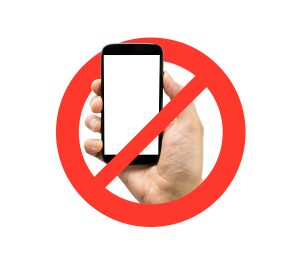
We've written here in the past about embracing attendees' love of mobile devices and how to integrate mobile into events. While including the use of mobile can make the event more interactive and also help appeal to a younger demographic, sometimes you just want attendees to focus. We'd like to take a look at what events would look like if phones, tablets, and computers were banned from events.
This thought likely made many of you gasp. Hours away from your phone and connectivity can be unnerving. A study from Deloitte found that people in the U.S. ages 18 to 75 check their device approximately 47 times per day. Even with this innate reliance on phones and the amplification social media can provide a brand, many entertainers are pushing for their fans to go dark. Musicians including Alicia Keys, Guns N' Roses, Adele and comedians Dave Chapelle and Chris Rock are calling their concerts and performances "phone-free zones." Rock even goes so far as to have any phone using offenders escorted out of the venue.
The leap to phone-free events may be the "easiest" to take with the government attendee market as many people are used to surrendering their phones daily to enter secure facilities. So, how can an event be phone free? There are several options:
- Honor system - Ask people to power down their phones and monitor the audience for phone use.
- Cases - There are a number of lockable pouches or bags that can be used to store phones. As people enter the venue, their phones will be placed in cases that will lock when they enter the phone-free zone. If attendees need to use their phones, they step outside of the phone-free zone to unlock the case.
- Drop off - Ask attendees to leave their phones at a registration desk or holding area for the duration of the event.
Being able to do it does not mean a phone-free event is the right option for all events. A phone blackout is best suited for short events where attendees are not required to be out of touch for an entire day. Longer events could look at instituting a phone ban for certain sessions within a larger conference.
A phone ban should not be arbitrary. Provide attendees with a good reason. Is there information or news being shared that is exclusive to attendees? Are there copyright or intellectual property issues with recording or sharing the information being presented? Is their undivided attention critical to the understanding of the material being presented?
We'd love to hear your thoughts on cell phone bans. Where do you see a ban helping the event experience? Have you been to an event with a ban? How did you adapt? Share your thoughts in the comments.


